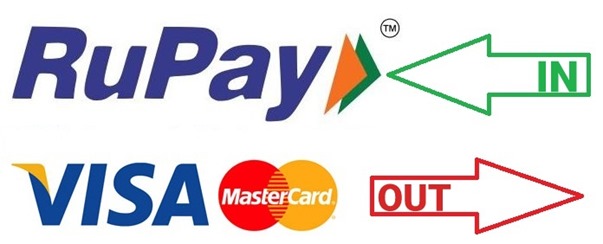In the month of May, President Pranab Mukherjee inaugurated RuPay, which is India’s first national payment gateway. Created by National Payments Corporation of India, RuPay has several advantages compared to private payment gateways such as low processing fees, data security and more.
While reporting this exciting news, to be very honest, we were quite skeptical regarding it’s adaptability and wide scale usage. Considering that it is a government owned and supported payment gateway, we assumed that it will take some time to spread and adapt.
But we were very wrong!
In a latest development, government is actively encouraging the usage of RuPay across everywhere, as they want it’s adoption to grow quickly. Such is the intensity of it’s promotion that for the first time in their 30 years of existence, global payment gateway biggies such as MasterCard and Visa are facing the heat.
As per reports coming in, Gurdial Singh Sandhu, secretary at the finance ministry’s department of financial services has asked all nationalized banks to issue debit cards which are RuPay enabled!

Normally, only one debit card is issued per account, but this time, bank officials have been categorically asked to tweak their rules, and issue one more RuPay enabled debit card which can use this new payment gateway.
Not only this, merchant establishments and traders have been specifically requested and encouraged to install sale terminals especially for RuPay enabled debit cards so that a wide scale adaption of India’s new payment gateway is made possible.
Industry experts are fearing that such official diktat from the government to nationalized banks can defer some customers to private banks as they are still using MasterCard or Visa payment gateways.
But AP Hota, MD & CEO of National Payments Corporation of India has rubbished such apprehensions as he said, “Such fears are unfounded. RuPay is a fully functional card payment system. We are also launching Platinum cards for HNI customers.”
Nationalized banks have now been given 6 months to issue a new RuPay enabled debit card to all it’s existing customers, inform and educate all bank employees in thousands of branches all over India and send an updated report to the government regarding the adaptation and usage.
Just for information, around 2 crore RuPay enabled debit cards have been issued so far.
Last year, Indians spend Rs 80,000 crore using debit cards, and its usage is increasing at an impressive rate of 35% every year. It seems that Indian Government has donned the cap of a startup this time, and is doing everything possible to increase RuPay’s usage. If the same momentum is maintained for another year or so, RuPay can easily capture more than 80% of the market in India, and this is a bad news for private payment gateways.
What is your opinion on the increased effort of Indian government to spread the usage of RuPay? Will it backfire or will it work?
–

But rupay have not available for online recharge, shopping on paytm & freecharge
What a great move and encouragement of swadesh movement….
Will definately support it and encourage the growing BHARAT…..
I have been using Visa and master card on daily basis. If we switch to rupay, it will increase value of Indian rupee and will strengthen our economy. Processing fees of Visa and master card is too high. It’s whooping 600 Indian rupees for one transaction! Considering the low cost of transaction, it must be promoted like union pay of china has become internationalized.
I am surprised that one of the advantages is data security!… How is that an advantage? Given the experience I would be hesitant to use RuPay!
Rupay have had ‘big plans’ for a while now. I dont see it even scratching the surface in the next 3 years!
The disease of pessimism. Keep it up
My bankers, Union Bank of India issued me a RuPay debit card when I lost my earlier one and it has worked without any hassles so far at all the places where I used my VISA card earlier. The transition was smooth and seamless. I think it RuPay should be encouraged. VISA and MasterCard has enjoyed monopoly over the market for long.